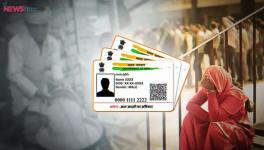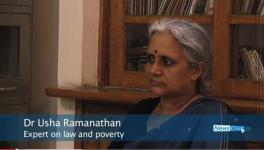Part II - Biometrics, Turning a 'Citizen' into a 'Subject'...
In the wake of controversies concerning the NATGRID and UID project involving collection of biometric data of the Indian population, noted law researcher Usha Ramanathan speaks to Newsclick about the politics behind this move. This is Part II of the two-part interview. Part I can be seen here
Rough Transcript
JS: Interestingly, one of the cables leaked by Wikileaks and as reported by and as reported by The Hindu establish the interest of the United States regarding biometrics in India the US showed keen interest and I quote India's strategic plan utilising biometrics id card technology in the military, law enforcement and private sectors. So do you think the whole exercise I mean it is also done the name of the national security securing people, that is actually leading somewhere to creating troubles in terms of security?
UR: Many of us has been raising this question that among these two agencies it is not the others are it's not that the other is innocent and benign but among the two agencies that have been pre qualified by the UID authority for doing the duplication basically for handling all our data including biometrics data there is Accenture who to us will seem to us like our neighbourhood corporate guy, Accenture is actually on a border control project with the United States Homeland Security and the L1 identity solutions which is like a to my mind is complete horror story. Their basic customer is CIA. They have people from CIA who kind of walk in and out of their office in the sense they work with them, they retire and they go. Actually, not so long back they had head of the CIA when he retired he was a Director of the L1 identity solutions. We are talking about handing over informations to these agencies which will then duplicate us and leave us benign. We are asking explanations how there can be any kind of security. When these are agencies which are bound tied so closely with the US establishment. Isn't there such a thing national security that they should be concerned about the whole population, database is going to be available with the foreign country. The interesting thing, I think it's sinistrally interesting in the sense he said we have got no single answer so far. The questions have been heard, the mainstream magazines have been carried. It is not I saw something and talked about it. It's been written about in the press and press people have written and not only those of us who are working on issue and yet there isn't even an attempt in giving answer nor has been a change in policy. When we are talking biometrics don't forget that this includes DNA. In India we have a bill that have been floating around 2007 called the DNA Bank Bill. So there are proposals that DNA bid should be compulsorily banked with the government. This is like, I don't think I need to explain to you how horrific it is to think that in a system where the state is already so powerful exercising much over people, now it's actually going to have various means of determining whether you are or you are not and allowing itself to decide whether you exist or you don't within various sets of databases. So this is like a you don't need to be a conspiracy theorist to be worried about this. There have to be limits on how the state exercises domain over a population. Whey would they do this? I see definitely there is one big role for biometrics industry. Biometrics industry is a growing industry and they need to push their product. There are various ways in which they do it. This is certainly one way. Secondly, I think the private industry, private enterprises are interested in this kind of data because if they can converge data about people, if they can have various sets of data on which they can work with by looking at the population as a market, it is a very convenient kind of thing to have all these. They have to show how is the UID different from the voter id card. Biometrics is the difference. So they have to show one more reason why technology needs to be used in a certain way. But notice also one thing. In the voter id card system it was not an outsource system. The government took responsibility and conducted that exercise itself. This is a completely outsource system. So it is industry that is running it, that is controlling it, that is dictating it.
JS: The chairperson comes from the industry.
UR: You know it's worst. The chairperson was a chair of another committee called TAG which produced what is called the TAGUP report. TAGUP is technology advisory group for unique projects. The one thing that I have learnt about it in past few months there is nothing unique about unique. You see the word unique being dropped everywhere. Apart from that, in that TAGUP report, they have suggested what should be set up our national information utilities. That is, government has a large amount of data with it. Government you know it is not capable of all these it's not technologically not feasible either for them. So there should be private enterprise which will set up national information utilities to whom the government will hand over information all they collect under various databases. It will be managed with these utilities and they will be private entities which will act in public interest. Now, just think about what it means and in the middle of all these when you look at the collection of statistics acts for instance, and if you look at UID, both these projects where they are talking of commercial use of data that is being generated. So essentially we are all body even body as a marker is converted into a commodity.
JS: Even at the international level we are seeing opposition being built vis a vis the bio profiling of the people. What has been the international experience vis a vis biometrics?
UR: You know there are at least two things which are interesting in this. One is how the US establishment abandoned it's project for a real id. George Bush was you know his administration after they brought in the homeland security. It's very interesting. I am going to take little diversion here. But our ASSOCHAM along with KPMG, in 2010 August I think they produced a report called homeland security in India and in that they say NATGRID and UID are the two ways in which homeland security is going to be brought into India. So this is not innocent that's what I am saying. The kind of imagination that is being brought in, is being brought in from countries like US. So there too in 2005, they considered they should have a real id which should also have biometrics as an element. And then that fizzled out and it didn't take off. One of the reasons that it didn't take off I don't know if howmany other reasons there are because a set of scientists who was sponsored by the FDI, Cococola so both government and non government private and these enterprises are sat and did a study of biometrics and came up with this that over a large swathe of population and over a period of time, it is not possible to guarantee the uniqueness of biometrics. So they abandoned it. Now, we are not even acknowledging that. We don't want to talk about it. In this government, we don't even want to talk about it. So you go away with it. Now, if the American population is a large swathe of population, what is the Indian population really like about? So that's one experience. The second experience is in the UK, where the labour government wanted to bring in this id project where biometrics is going to be a part and they abandoned it and it is very interesting the language that was used when they abandoned it when the conservative government came in. So actually it is the conservatives said no to this. The language used by the Home Secretary at that time, she said, well perhaps she is still the Home Secretary, she said it is intrusive bullying, when you get into people's life, you ask them to give all these data or else, this is intrusive bullying and that's one thing and the LAC report and of course she also said that we are the servants of the people not their masters. I think it is extremely important statement for a country like this where the government is increasingly acting like it is a masters on everything and they have a right to control it which takes me of course back to a question that you asked earlier, why would they do this. Biometrics industry is one but in think it is also a project of social control and social monitoring. I don't think there is any running away from it. When they are not interested, they don't need to use it. But if they get interested in you, tracking you, following you, knowing where you go. What kind of think you do, what surprises me in the whole thing is journalists have not got upset by this. There will be no way they can protect their sources. If they are going to allow for a project like this to come in. I mean that's a choice that different people make. But going back to your question, London School of Economics did a study they have a identity project that has been on for a period of time and those who wanted the project to go through, they castigated the London School of Economics identity project ultimately they proved to be right in what they were saying and in any case when the project got removed, one of the thing they said was look at the extra ordinary expense that is involved in this. If you look at the UID project, one of the significant thing is how they never talk of expense. In fact, you have the Prime Minister and I think even the Finance Minister saying cost is not a concern. As and when necessary, we will give you money. So the idea that you can have a country where you don't even have money to feed a population. But you have enough to be putting endlessly into a project which may or may not produce result. Mr. Nilekani calls it an open architecture. He says, it is open architecture so anybody can use. I can't tell you if there is any particular use for it, anybody can use it. Now, for a project of that nature where they are simply collecting the data without being sure whether it will be of any use or not. There is a certain something about public expenditure and who that money goes to which is significant.
JS: Thank you Usha for being with us. This was Usha Ramanathan and we talked about biometrics and how it is going to effect the day to day lives of people, definitely not in a very positive factor, very negative. Thank you.
Get the latest reports & analysis with people's perspective on Protests, movements & deep analytical videos, discussions of the current affairs in your Telegram app. Subscribe to NewsClick's Telegram channel & get Real-Time updates on stories, as they get published on our website.


















